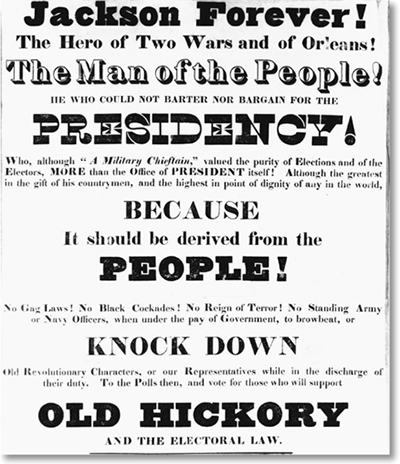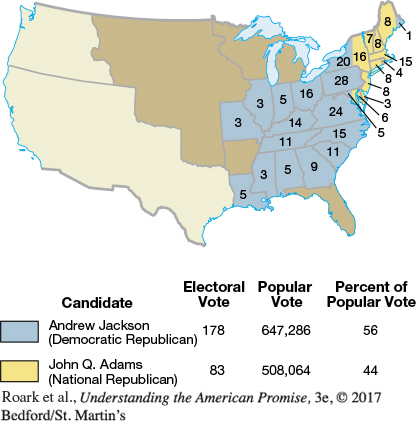The Election of 1828 and the Character Issue
The campaign of 1828 was the first national election dominated by scandal and character questions. Claims about morality, honor, and discipline became central because voters used them to comprehend the kind of public official each man would make. Jackson and Adams presented two radically different styles of manhood.
John Quincy Adams was vilified by his opponents as an elitist, a bookish academic, and even a monarchist. They attacked his “corrupt bargain” of 1824—the alleged election deal between Adams and Henry Clay (see “The Election of 1824” in chapter 10). Adams’s supporters countered by playing on Jackson’s fatherless childhood to portray him as the bastard son of a prostitute. Worse, the cloudy circumstances around his marriage to Rachel Donelson Robards in 1791 gave rise to the story that Jackson was a seducer and an adulterer, having married a woman whose divorce from her first husband was not entirely legal. Pro-Adams newspapers howled that Jackson was sinful and impulsive, while portraying Adams as pious, learned, and virtuous.
> PLACE EVENTS
IN CONTEXT
How did the presidential election of 1828 and Andrew Jackson’s victory reflect the changes that had come with the market economy?
Editors in favor of Adams played up Jackson’s violent temper, as evidenced by his participation in many duels, brawls, and canings. Jackson’s supporters used the same stories to project Old Hickory as a tough frontier hero who knew how to command obedience. As for learning, Jackson’s rough frontier education gave him a “natural sense,” wrote a Boston editor, that “can never be acquired by reading books—it can only be acquired, in perfection, by reading men.”
Jackson won a sweeping victory, with 56 percent of the popular vote and 178 electoral votes to Adams’s 83 (Map 11.2). Old Hickory took most of the South and West and carried Pennsylvania and New York as well; Adams carried the remainder of the East. Jackson’s vice president was John C. Calhoun, who had just served as vice president under Adams but had broken with Adams’s policies. [[LP Photo: P11.05 Campaign Poster from 1828/


After 1828, national politicians no longer deplored the existence of political parties. They were coming to see that parties mobilized and delivered voters, sharpened candidates’ differences, and created party loyalty that surpassed loyalty to individual candidates and elections. Adams and Jackson clearly symbolized the competing ideas of the emerging parties: a moralistic, top-down party (the Whigs) ready to make major decisions to promote economic growth competing against a contentious, energetic party (the Democrats) ready to embrace liberty-loving individualism.
Understanding the American Promise 3ePrinted Page 292